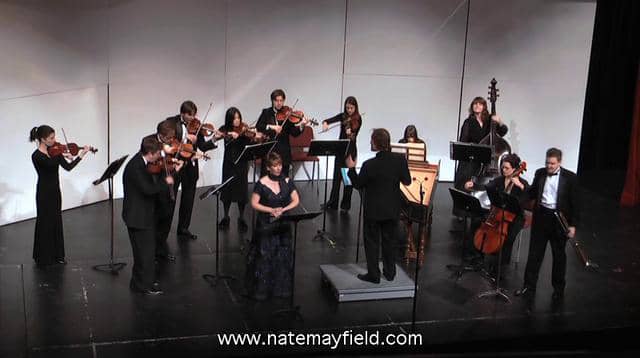

On Saturday night, during the performance by the Quicksilver Baroque Ensemble, I realized just how strange the modern attitude towards classical music is. I use classical in the sense that it is old and instrumental non-pop music. The genre is technically baroque rather than classical. Although it is stated in the programs that the members of Quicksilver are considered “rock stars within the early music scene,” the performance felt especially formal, though I suspect this was no fault of the performers. I sat in the front row and experienced an anxious girl’s worst nightmare. In the middle of a six-movement piece, when the music got whispery soft and delicately beautiful, I had to cough. At that moment, coughing seemed like the most disrespectful thing I could ever do during this concert, which I was enjoying immensely. The more I thought about it, the harder it was to hold in the cough until tears were streaming down my face and I felt like I was about to explode. It felt like a lifetime passed before the applause came and I could finally cough my lungs out. Thinking over it now, it seems strange to me that this environment would have made me feel so uncomfortable doing such a normal thing. Part of it is my anxiety, but I think it’s worth looking at the reason why classical concerts feel formal enough to provoke physical discomfort. Some would rather avoid going to that sort of event at all simply because the air can be so stuffy and rigid. But it doesn’t have to be. Quicksilver put on a wonderful concert that was objectively cool and unique, so it must be pressure from other audience members or society in general that has created this precedent for propriety-driven apprehension in younger audience members.
Although Baroque music is a niche subject, the members of Quicksilver come from different musical backgrounds, and as far away as the 17th century might seem, it is not so far away as to be completely un-relatable for a modern audience. The spectacle of the performance in itself was interesting to see. The stage was set with a beautiful harpsichord with gold accents and a small portable organ with intricate carvings in the wood. Both the harpsichord and the organ were played by the multi-talented Avi Stein. By far the most interesting thing on stage was the theorbo played by Charles Weaver. A theorbo is like a lute with an absurdly long neck. The whole instrument is about six feet long, so watching someone play something so large is fascinating. Weaver played with a wonderful expression, especially in a piece by Marin Marais where he communicated a raw sadness to the audience in a duet that he played with David Morris, who was on viola da gamba. The two instruments complemented each other and almost melted into one another. It was nice to get the experience of hearing different mixes of the instruments rather than just hearing everyone play the entire time. Viola da gamba looks a lot like a cello, but is older and tweaked a little. The other two players were Robert Mealy and Julie Andrijeski, both on violin. The violins were much like modern violins, except for the size of the bows. The bows they used were smaller and better suited to the agility and quick ornamentation of Baroque music rather than the long, smooth notes of more modern classical music.
The players have different musical backgrounds and interests aside from the baroque. Perhaps most interestingly for college-aged readers, David Morris played on the album “Have One on Me” by hipster folk singer and harpist, Joanna Newsom. These baroque instruments and styles are quite translatable to a modern setting, seeing as Newsom’s album came out in 2010.
Quicksilver’s repertoire was focused on showing the versatility of Baroque music between countries as well as bringing historical imaginings to life. It felt as if we had traveled back in time to some fancy court, but at the same time, the music was both evocative and stirring. The concert contained music from English and French artists, and the two were clearly in conversation with one another. Overall it was an informative and fascinating concert, and I do not mean to sound pretentious or old, but it is a bit of a shame that younger people do not feel comfortable attending concerts like this. Indeed, it’s a shame that I felt the environment was stifling enough that I would not let myself cough, and I attribute that to a degree of pretentiousness that is attached to old music. The music is being performed on a college campus, and it’s there to be appreciated. It should be okay to cough and okay to listen in whatever relaxed way you want. I’m going to make a promise to myself to be more comfortable in my skin next time I go to a similar concert. This air of formality that has long been attached to classical concerts is neither practical nor pleasant, and it detracts from possible attendees as well as the audience’s experience.